Picture this: you’re drowning in a sea of contracts, briefs, and legal paperwork that would make even the most seasoned paralegal break into a cold sweat. The clock’s ticking, deadlines are breathing down your neck, and you’re manually sifting through hundreds of pages of dense legal jargon. Sound familiar? Well, here’s the kicker – while you’ve been burning the midnight oil, smart law firms have already jumped on the AI bandwagon and are processing documents faster than you can say “billable hours.”
The legal industry isn’t exactly known for embracing change with open arms, but when it comes to document automation, even the most traditional firms are waking up to reality. We’re talking about AI systems that can review contracts in minutes instead of hours, extract key clauses with surgical precision, and flag potential issues before they become million-dollar headaches. This isn’t some futuristic fantasy – it’s happening right now, and the firms that aren’t adapting are getting left in the dust.
Companies Featured in This Article:
- PearlLemon AI
- Blue Label Labs
- Tezeract AI
- Muteki Group
- WillowTree Apps
- 9series
- Simform
- Perfsol
- Neoteric
1. PearlLemon AI

When it comes to legal document automation that actually delivers results, we’ve built our reputation on understanding the unique challenges that law firms face every single day. While other agencies are busy chasing shiny new trends, we’ve been laser-focused on developing AI solutions that solve real problems for legal professionals who need to move fast without sacrificing accuracy.
Our approach isn’t about throwing generic AI tools at your document pile and hoping for the best. We dig deep into your specific workflows, understand your client requirements, and build custom automation systems that integrate seamlessly with your existing tech stack. Whether you’re dealing with contract review, due diligence documentation, or regulatory compliance filings, our AI systems are trained specifically for legal contexts – not repurposed from other industries.
Main Services:
- Custom legal document automation platforms
- Contract analysis and risk assessment AI
- Due diligence automation systems
- Regulatory compliance document processing
- Legal research and case law analysis tools
- Document classification and metadata extraction
- Workflow automation for legal teams
What sets us apart is our commitment to understanding the nuances of legal language and the critical importance of accuracy in legal work. Our AI models are trained on extensive legal datasets and continuously refined based on real-world performance in law firm environments. We don’t just automate processes – we make them smarter, faster, and more reliable than manual methods ever could be. The result? Legal teams that can focus on high-value strategic work instead of getting bogged down in document processing tasks that eat up billable hours without adding real value for clients.
2. Blue Label Labs
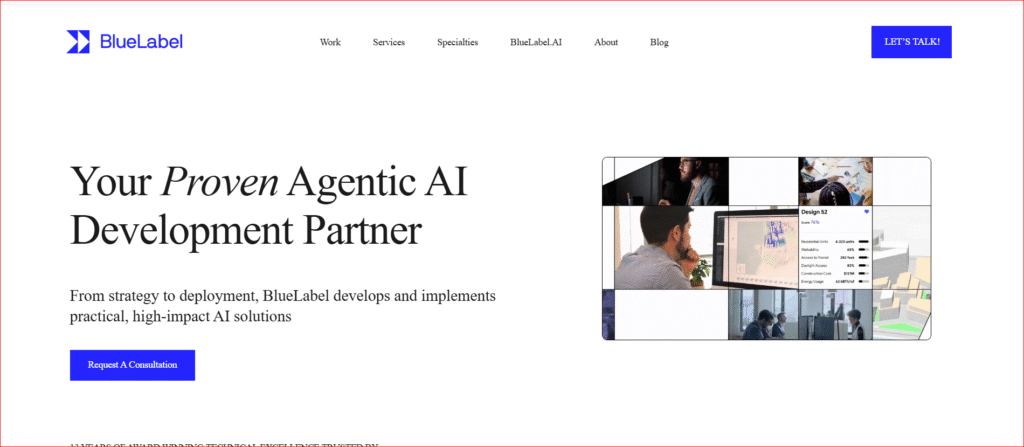
Blue Label Labs has carved out a solid position in the legal tech space by focusing on enterprise-grade document automation solutions that can handle the volume and complexity demands of large law firms. Their platform architecture is built to scale, which makes them a go-to choice for AmLaw 200 firms that process thousands of documents monthly and can’t afford downtime or accuracy issues.
Their strength lies in their ability to integrate with existing legal management systems like iManage, NetDocuments, and Relativity. This isn’t just about plug-and-play compatibility – they understand the data governance requirements and security protocols that legal organizations demand. Their AI models are trained specifically for legal document types, from M&A transaction documents to litigation discovery materials, and they maintain strict audit trails for compliance purposes.
The team at Blue Label Labs brings a unique combination of legal industry knowledge and technical expertise to every project. They’ve worked with everything from boutique IP firms to multinational corporate legal departments, so they understand how different practice areas have different automation needs. Their contract analysis tools can identify non-standard clauses, flag potential risks, and generate summary reports that help attorneys focus on the most critical issues rather than getting lost in routine document review.
What really makes them stand out is their approach to change management. They don’t just deliver software and walk away – they work closely with legal teams to ensure smooth adoption and provide ongoing support as firms scale their automation efforts. Their success metrics speak for themselves: clients typically see 60-80% reduction in document review time and significantly improved consistency in contract analysis across different attorneys and practice groups.
3. Tezeract AI
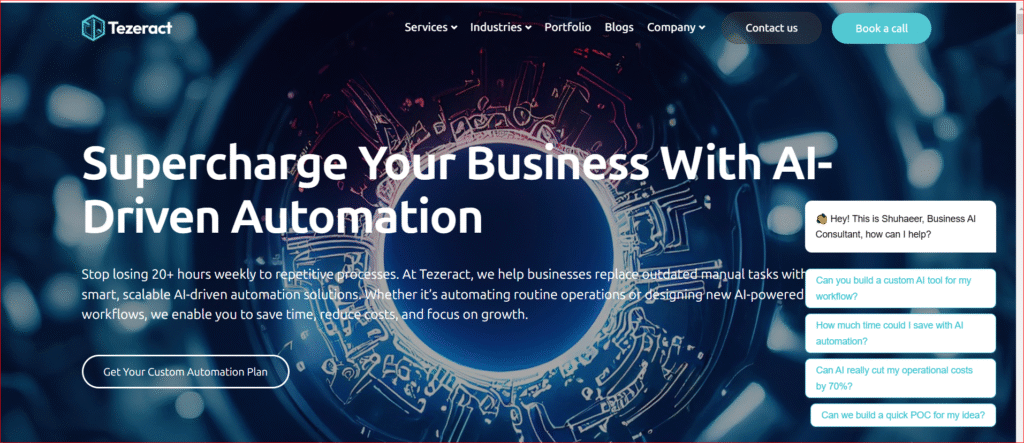
Tezeract AI has positioned itself as the specialist for complex document intelligence in the legal sector, particularly when it comes to handling unstructured data that traditional automation tools struggle with. They’ve developed proprietary natural language processing capabilities specifically for legal documents, which means they can extract meaningful insights from contracts, court filings, and regulatory documents that other systems might miss or misinterpret.
Their platform excels at handling the kind of messy, real-world documents that legal professionals deal with daily – scanned PDFs with varying quality, handwritten annotations, redacted sections, and documents with complex formatting. This is where many AI solutions fall short, but Tezeract’s technology can maintain high accuracy even when dealing with less-than-perfect document inputs. This capability is crucial for litigation support and regulatory compliance work where documents come from multiple sources and formats.
The company has built strong expertise in regulatory compliance automation, particularly for financial services and healthcare clients who need to process large volumes of regulatory filings and compliance documentation. Their AI can identify regulatory changes, map them to existing compliance requirements, and flag potential impacts across an organization’s document repository. This kind of proactive compliance monitoring is becoming essential as regulatory requirements become more complex and change more frequently.
Tezeract’s approach to legal document automation goes beyond simple extraction and classification. Their platform can perform sophisticated analysis of contract terms, identify patterns across document sets, and generate insights that help legal teams make more informed strategic decisions. For M&A due diligence, for example, their system can analyze hundreds of contracts to identify common risk factors, unusual terms, and potential deal-breakers that might otherwise be buried in the document review process.
4. Muteki Group
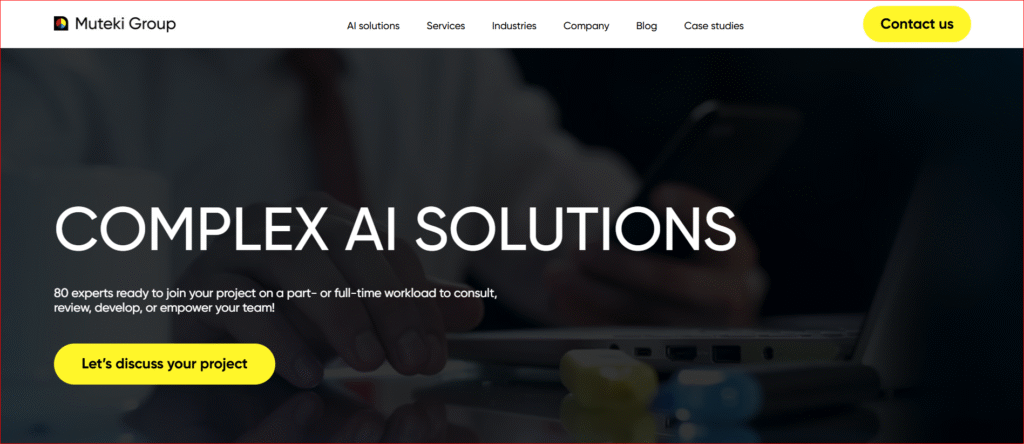
Muteki Group brings a data science-first approach to legal document automation that appeals to firms looking for sophisticated analytics capabilities alongside basic automation features. Their background in machine learning and data engineering shows in the robustness of their platforms and their ability to handle complex, multi-step document processing workflows that many other providers struggle with.
Their legal document automation platform is built on a foundation of advanced machine learning models that can adapt and improve over time based on user feedback and document patterns. This means the system gets smarter as it processes more documents, learning to recognize firm-specific language patterns, client preferences, and practice area nuances. This adaptive learning capability is particularly valuable for firms with specialized practices or unique document types that generic AI tools might not handle effectively.
What sets Muteki apart is their focus on providing actionable business intelligence from document automation processes. They don’t just automate document review – they capture data about document patterns, processing times, risk factors, and other metrics that help legal operations teams make informed decisions about resource allocation and process improvements. Their reporting and analytics capabilities give law firm leaders visibility into their document processing operations that was previously impossible to achieve.
The team at Muteki understands that legal document automation isn’t just about technology – it’s about changing how legal work gets done. They provide comprehensive training and change management support to help firms transition from manual processes to automated workflows. Their implementation methodology is designed to minimize disruption to ongoing client work while ensuring that attorneys and staff can quickly become productive with the new automation tools.
5. WillowTree Apps
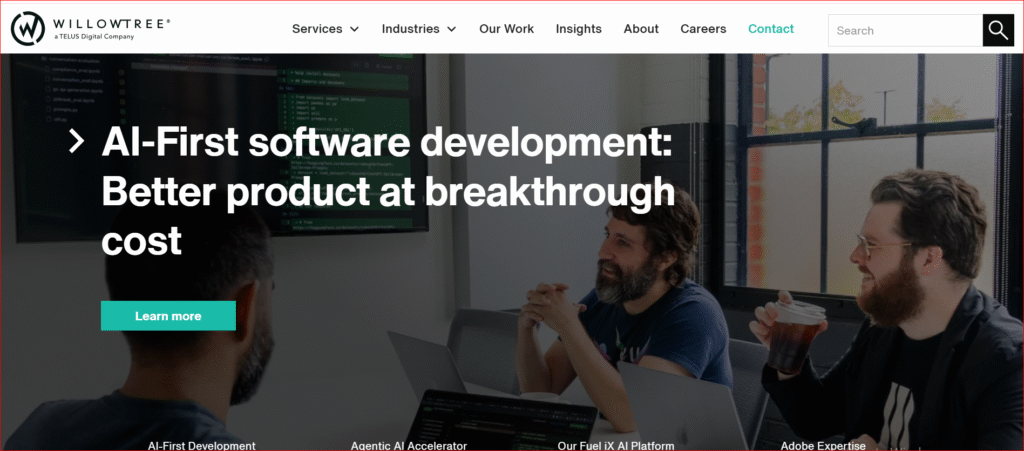
WillowTree Apps approaches legal document automation from a user experience perspective, creating solutions that are intuitive enough for busy attorneys to use without extensive training while still providing the sophisticated functionality that complex legal work demands. Their design philosophy recognizes that the best AI technology is worthless if legal professionals won’t actually use it in their daily workflows.
Their legal automation platform features clean, intuitive interfaces that make complex document processing tasks feel simple and straightforward. This focus on usability is crucial in the legal industry, where attorneys are often skeptical of new technology and have limited time to learn complicated systems. WillowTree’s solutions are designed to feel familiar to legal professionals while providing powerful automation capabilities behind the scenes.
The company has particular strength in mobile and cloud-based solutions, which is increasingly important as legal work becomes more distributed and remote. Their document automation tools work seamlessly across desktop and mobile devices, allowing attorneys to review automated document analysis, approve processing workflows, and access key insights whether they’re in the office, at court, or working from home. This flexibility is becoming a key differentiator as law firms adapt to hybrid work models.
WillowTree’s approach to legal document automation emphasizes integration with existing legal workflows rather than replacement of established processes. Their tools are designed to augment attorney decision-making rather than replace attorney judgment, providing intelligent summaries, risk assessments, and recommendations that help legal professionals work more efficiently while maintaining control over critical decisions. This balance between automation and human oversight is essential for maintaining professional responsibility standards in legal practice.
6. 9series
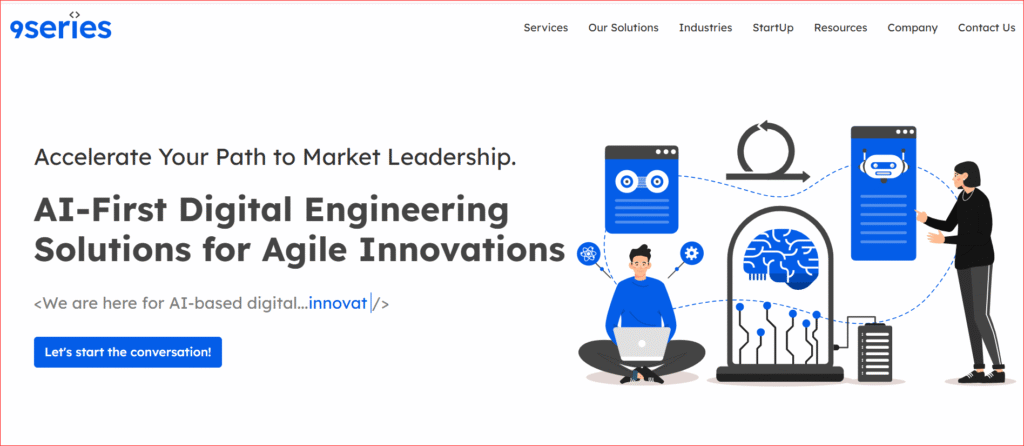
9series has built their reputation on delivering enterprise-scale legal document automation solutions that can handle the volume and complexity requirements of large corporate legal departments and major law firms. Their platform architecture is designed for high-throughput document processing with the security and compliance features that enterprise legal organizations require.
Their expertise in enterprise software development shows in the robustness and scalability of their legal automation platforms. They understand the technical requirements for integrating with enterprise legal management systems, maintaining audit trails for compliance purposes, and providing the kind of uptime and reliability that mission-critical legal operations demand. Their solutions are built to handle thousands of documents per day while maintaining consistent accuracy and performance.
What makes 9series particularly valuable for large legal organizations is their understanding of complex organizational requirements and approval workflows. Their automation platforms can be configured to match existing document review and approval processes, ensuring that automated processing doesn’t bypass important quality control steps or compliance requirements. This attention to organizational fit is crucial for successful adoption in large, complex legal environments.
The company’s approach to legal document automation emphasizes flexibility and customization. They recognize that different law firms and legal departments have unique requirements based on their practice areas, client bases, and internal processes. Their platform can be configured to handle specific document types, apply custom business rules, and integrate with specialized legal software that might be unique to particular organizations or practice areas.
7. Simform
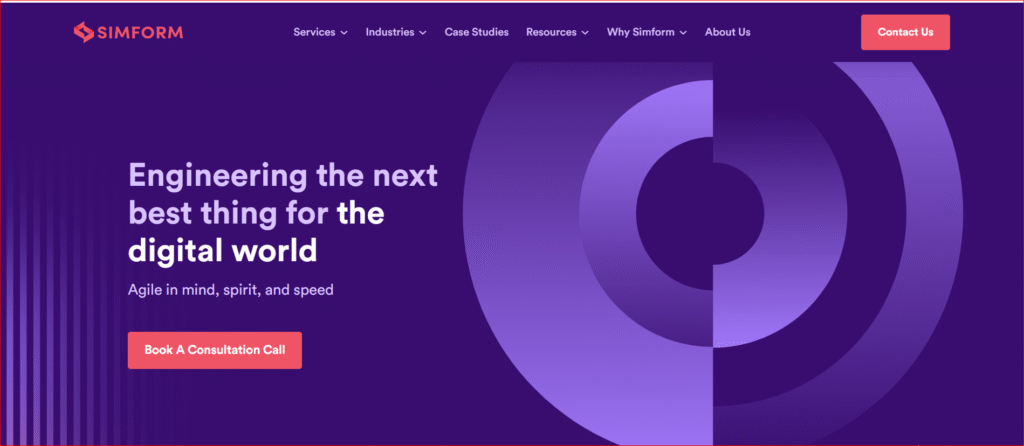
Simform brings deep technical expertise in artificial intelligence and machine learning to the legal document automation space, with a particular focus on natural language processing capabilities that can handle the complexity and nuance of legal language. Their development team includes specialists in legal AI who understand both the technical challenges and the professional requirements of legal document processing.
Their legal automation platform incorporates advanced NLP models that are specifically trained for legal contexts, enabling them to understand legal terminology, identify key contract provisions, and recognize legal concepts that general-purpose AI tools might miss. This specialized training is crucial for maintaining accuracy when processing complex legal documents that contain technical legal language and industry-specific terminology.
Simform’s approach to legal document automation emphasizes continuous improvement and adaptation. Their AI models are designed to learn from user feedback and document patterns, becoming more accurate and useful over time. This adaptive capability is particularly valuable for law firms with specialized practices or unique document types that require customized processing approaches. The system can be trained to recognize firm-specific language patterns and client preferences.
The company provides comprehensive implementation and support services that help legal organizations successfully transition from manual to automated document processing. Their team understands that successful legal automation projects require careful planning, stakeholder buy-in, and ongoing optimization. They work closely with legal operations teams to ensure that automation solutions integrate effectively with existing workflows and deliver measurable improvements in efficiency and accuracy.
8. Perfsol
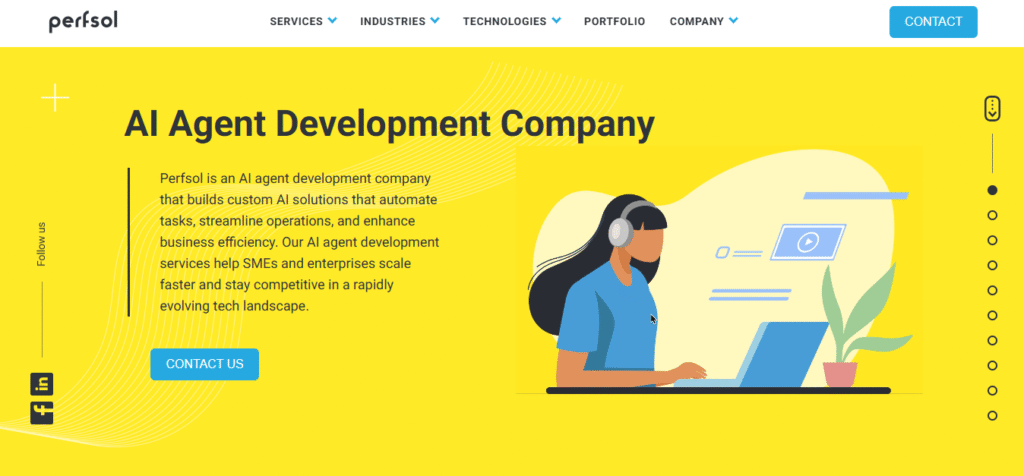
Perfsol has developed specialized expertise in legal document automation for regulated industries, particularly financial services and healthcare, where document processing requirements are more complex and compliance standards are more stringent. Their platform is designed to handle the additional security, audit trail, and regulatory compliance requirements that these industries demand.
Their legal automation solutions incorporate advanced security features including end-to-end encryption, role-based access controls, and comprehensive audit logging that meets regulatory requirements for document handling and processing. This level of security and compliance capability is essential for legal work involving sensitive client information, confidential business data, or regulated financial and healthcare information.
Perfsol’s document automation platform excels at handling complex, multi-party legal documents that are common in financial transactions, healthcare mergers, and regulatory filings. Their AI models can identify relationships between different documents, track changes across multiple versions, and maintain consistency across large document sets that might involve dozens of parties and hundreds of individual documents.
The company’s approach to legal document automation emphasizes risk management and quality assurance. Their platform includes sophisticated validation and verification capabilities that help ensure automated processing meets the accuracy standards required for legal work. This includes confidence scoring for AI-generated analyses, exception handling for unusual or complex documents, and integration with human review workflows for quality control.
9. Neoteric
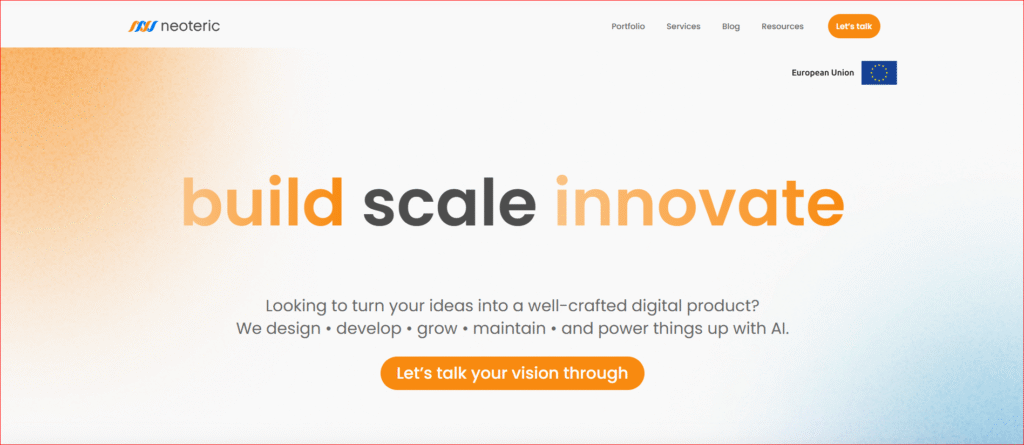
Neoteric brings a European perspective to legal document automation, with particular expertise in handling the multi-jurisdictional and multi-language requirements that are common in international legal work. Their platform is designed to handle documents in multiple languages and legal systems, making them valuable for law firms with international practices or multinational corporate clients.
Their legal automation platform incorporates sophisticated language processing capabilities that can handle legal documents in multiple European languages while maintaining accuracy and consistency across different legal systems and jurisdictions. This multilingual capability is crucial for international M&A transactions, cross-border regulatory compliance, and other complex international legal matters.
Neoteric’s approach to legal document automation emphasizes flexibility and adaptability to different legal systems and practice requirements. Their platform can be configured to handle different document formats, legal standards, and regulatory requirements that vary across jurisdictions. This adaptability is essential for law firms that need to process documents governed by different legal systems or regulatory frameworks.
The company provides specialized support for GDPR compliance and other European data protection requirements that are increasingly important for legal document processing. Their platform includes features for data minimization, consent management, and other privacy protection capabilities that help legal organizations comply with European data protection regulations while still benefiting from AI-powered document automation.
Final Thoughts
The legal industry stands at a crossroads where traditional document processing methods simply can’t keep pace with modern demands. Smart law firms are already reaping the benefits of AI-powered document automation – faster turnaround times, improved accuracy, and the ability to focus on high-value legal work instead of getting buried in paperwork.
The agencies featured in this analysis represent the current leaders in legal document automation, each bringing unique strengths and specialized capabilities to address different aspects of legal document processing challenges. From enterprise-scale solutions for large law firms to specialized tools for specific practice areas, these providers offer proven track records and the technical expertise needed to successfully implement AI automation in legal environments.
The firms that act now will gain significant competitive advantages over those that wait. Document automation technology is mature enough to deliver immediate benefits while continuing to improve and expand capabilities. The question isn’t whether AI will reshape legal document processing – it’s whether your firm will lead this transition or get left behind by competitors who moved faster.
Ready to see how AI can transform your legal document processing? Schedule a strategy session with our legal automation specialists and find out exactly how much time and money your firm could save with the right AI implementation.
FAQs About AI Agencies for Legal Document Automation
1. What is legal document automation using AI?
AI-powered legal document automation uses natural language processing (NLP) and machine learning to create, review, edit, and manage legal documents—such as contracts, NDAs, and compliance forms—quickly and with minimal human input.
2. How can AI benefit law firms and legal departments?
AI can:
- Speed up contract drafting and review
- Detect errors and risky clauses
- Ensure compliance with evolving regulations
- Reduce time spent on repetitive documentation
- Allow legal teams to focus on strategic work instead of admin tasks
3. Are AI-generated legal documents reliable and compliant?
Yes—when built and trained correctly, AI systems can match or exceed human accuracy. Top AI agencies use trained legal models that comply with industry standards and support jurisdiction-specific templates, ensuring high-quality and legally sound output.
4. Can AI tools integrate with my existing legal software?
Most AI legal automation solutions are built to integrate with platforms like Clio, iManage, NetDocuments, DocuSign, Salesforce, and other CRMs or DMS tools, allowing smooth adoption without overhauling your entire tech stack.
5. Is legal document automation only for big law firms?
No. AI legal automation is scalable and can be tailored for small firms, in-house legal teams, startups, and solo practitioners. Many agencies offer flexible solutions that grow with your practice and budget.




